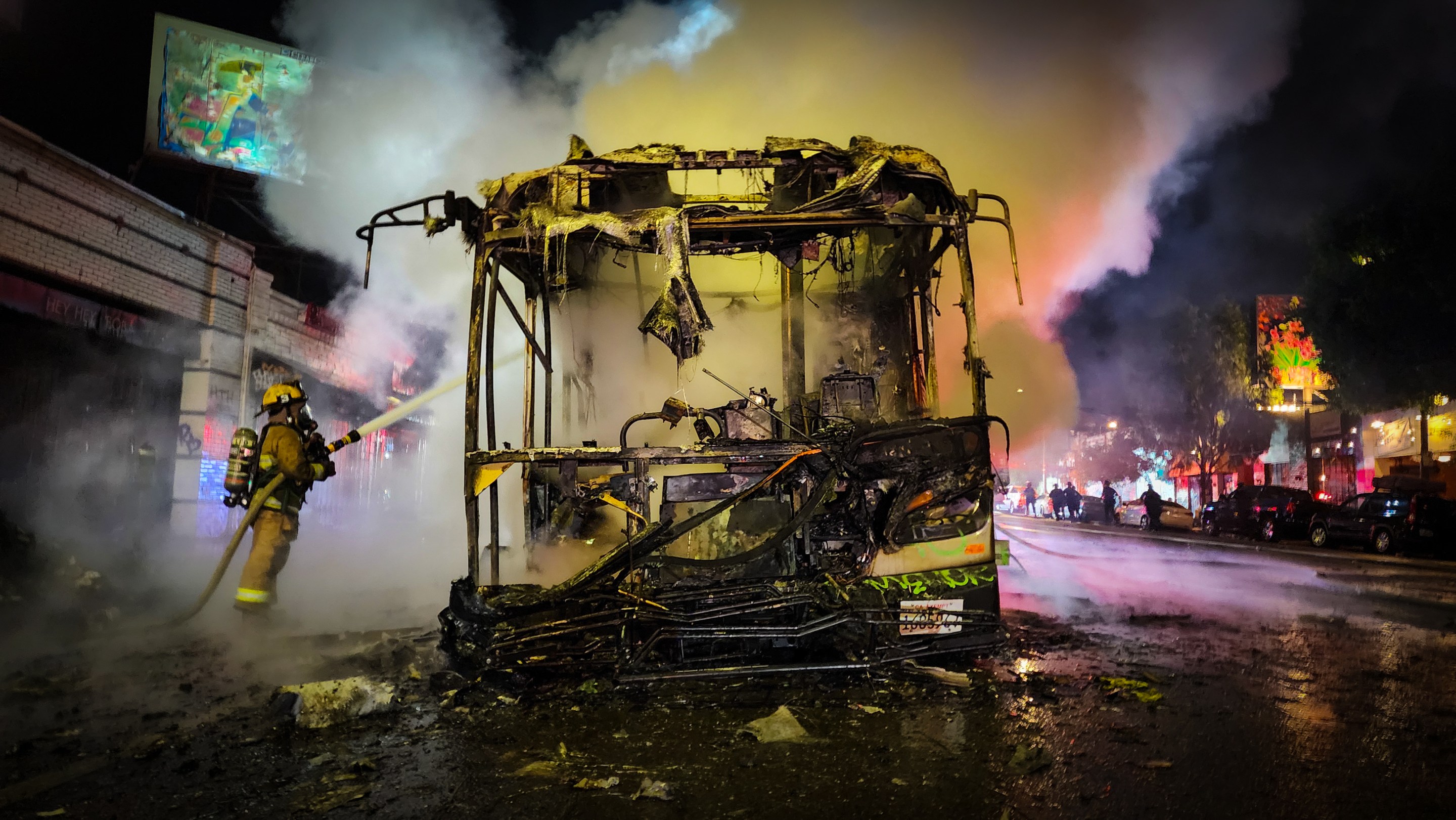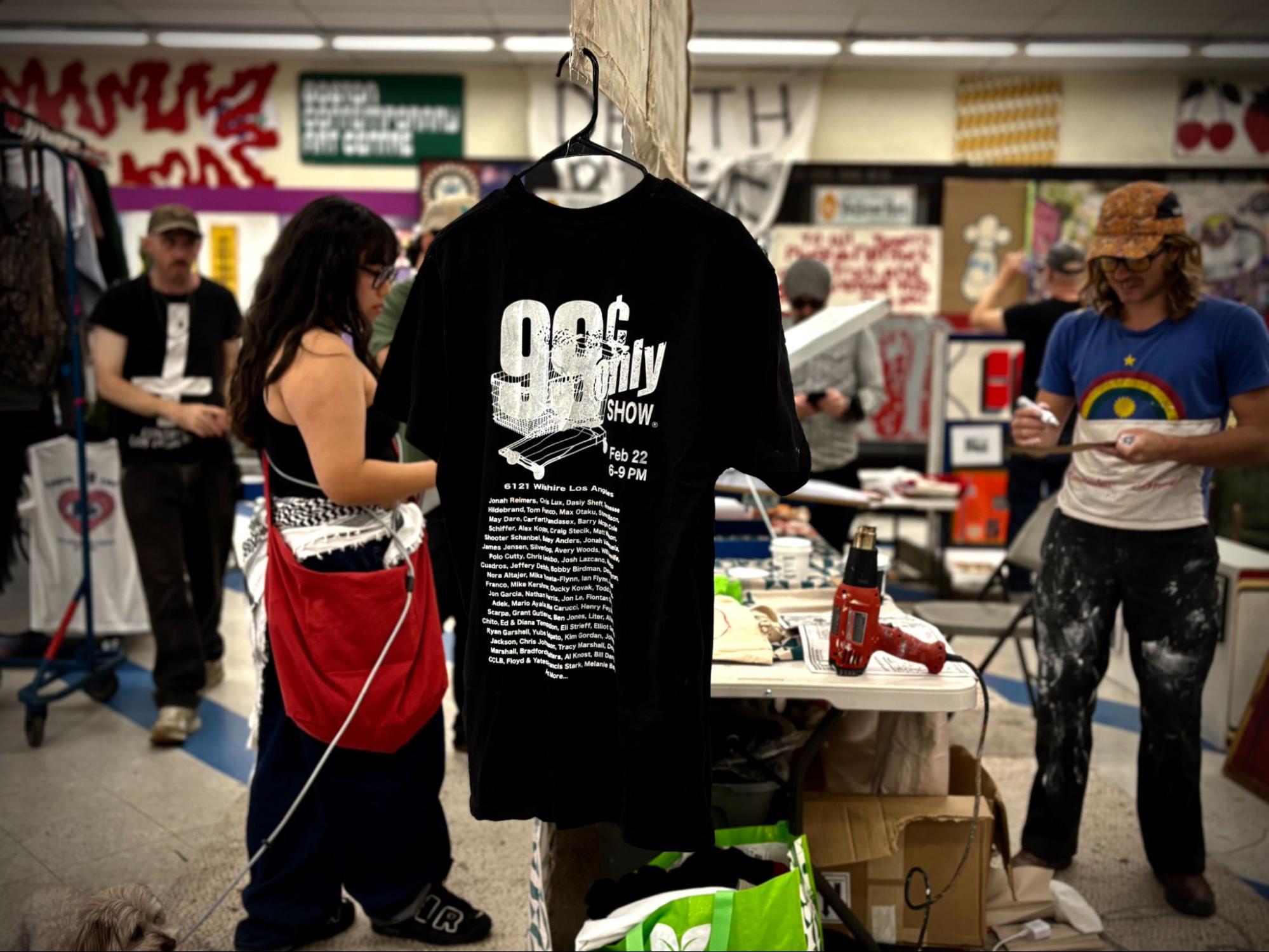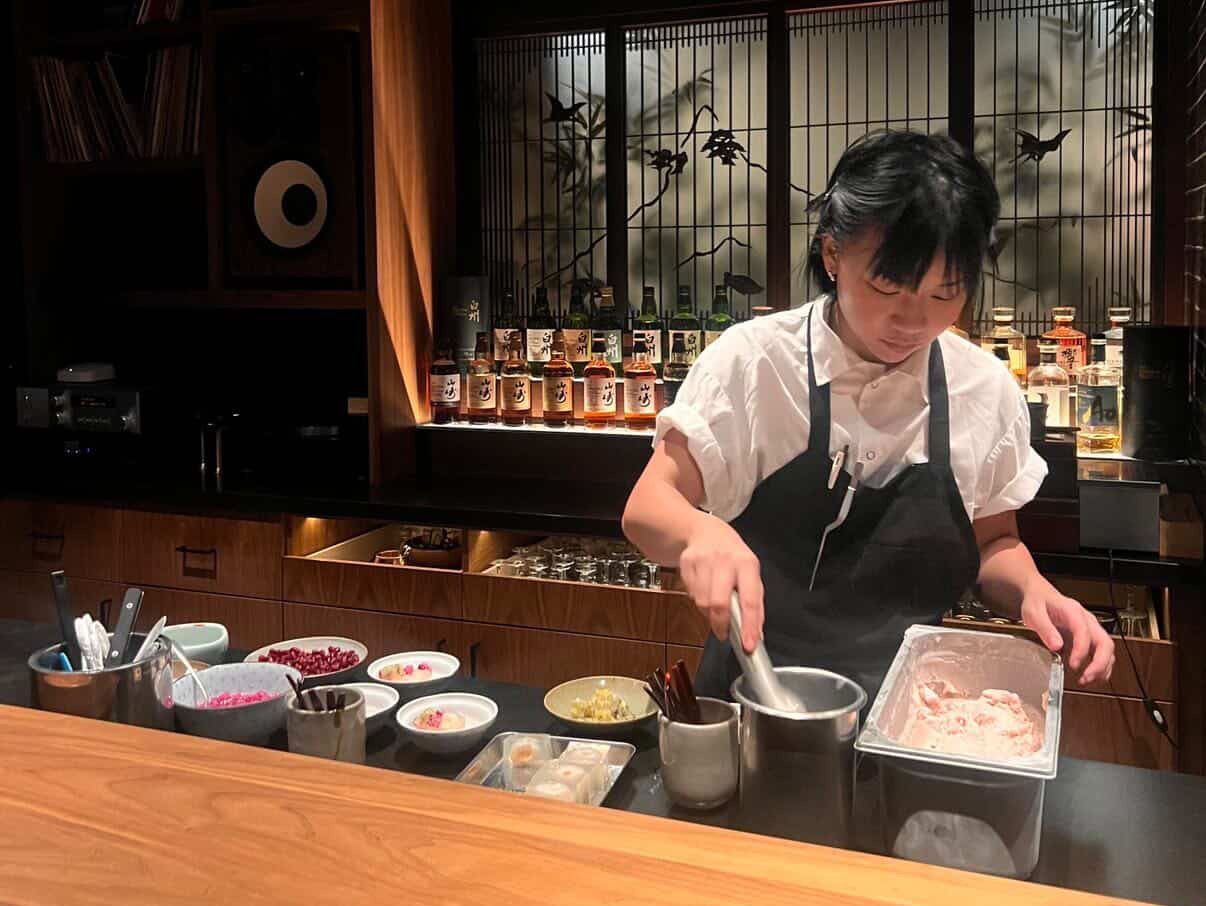- After a million-dollar Metro bus was lit on fire and subsequently destroyed, people on social media were quick to criticize Dodger fans who took to the streets of Echo Park to celebrate the historic World Series victory.
- Most people on social media, however, did not question why dozens of LAPD officers watched people destroy the bus, instead of doing something to stop people from vandalizing it.
- There is little evidence that suggests that police stop or prevent crimes from happening. “Policing is primarily a reactive institution so that after harms have already occurred, policing intervenes through a control and punishment model,” says Alex Vitale, a sociology professor with 30 years of experience working on policing issues.
When a Metro 4 bus traveling through Echo Park passed through the intersection of Douglas Street and Sunset Boulevard, shortly after the Dodgers won the 2024 World Series, fans blocking the intersection didn’t just allow the bus pass through, they cheered it on as if the bright orange bus had helped the boys in blue secure their victory that night.
“Metro! Metro! Metro!” Fans shouted while a bus rider pounded on the vehicle’s front door window in celebration, as the bus driver carefully made their way through the packed intersection.
After getting through, the bus continued past El Compadre, the Short Stop, and Little Jewel before it approached another group of rowdy Dodger fans blocking the intersection of Echo Park and Sunset Boulevards.
After crawling through dense traffic for over an hour, while fans lit off fireworks and drivers did donuts, the bus eventually stopped in front of an eyewear shop, a few hundred feet away from the crowd.
It didn’t move another inch after that.
Over the course of several hours, the bus was tagged inside and out, while dozens of people climbed onto the bus’ roof. Windows were shattered. And a group of people unsuccessfully tried to tip the bus over onto its side.
At around 12:20 AM, two fireworks were let off inside the bus. The first sent shards of broken glass flying at a crowd of people on the sidewalk. The second ignited a fire, eventually filling the interior with suffocating black smoke.
As the bus went up in flames, a photographer documenting the night’s events with a still camera and a handheld flash with a large softbox on it repeatedly shouted into the inferno, “Is anybody inside?” Nobody answered back.
Eventually the bus’s exterior became enveloped in flames that reached as high as two stories. Later, an employee at a nearby barbershop on Sunset Boulevard told L.A. TACO that they were afraid the roof of a neighboring business was going to catch fire.
Much of the desmadre leading up to the bus fire unfolded within view of dozens of police officers in riot gear that were stationed within hundreds of feet from the bus. All under the watchful eye of an LAPD helicopter circling above, costing the city’s taxpayers roughly $2,916 per flight hour.
But instead of stopping people from destroying a public bus that cost taxpayers nearly $1 million, the LAPD watched the chaos unfold.
Police did not begin clearing the area until around 12:26 AM, minutes after the fireworks went off, and more than an hour and 20 minutes after people began tagging the bus. By 12:33 AM, LAPD officers created a skirmish line in front of the bus, effectively preventing anyone from getting near it.
Officers used “less-lethal” munitions to disperse the crowd. A father and son who were selling bacon-wrapped hot dogs during the celebrations were hit in the shoulder and head by LAPD projectiles, they told L.A. TACO. Some revelers responded by throwing glass bottles at officers. There were no reports of officers being injured.
Los Angeles Fire Department (LAFD) Captain Adam VanGerpen told L.A. TACO that firefighters first responded to the scene at 12:01 AM, twenty minutes before the fatal firework went off. “But then basically they ran into a crowd, so LAPD kept them back at the perimeter,” VanGerpen said.
After the bus caught fire, firefighters “let the unit itself burn” for more than twenty minutes because if they immediately went in with water to extinguish the fire, the water could have caused a “catastrophic explosion,” VanGerpen said, due to the fact that the Metro bus runs on compressed natural gas.
“Typically because of the danger with compressed natural gas (CNG), if there is something on the bus that’s on fire that is not near a CNG tank, then we can extinguish that,” VanGerpen said. But if there is fire near the tank they can’t because they might disable the tank’s thermal pressure relief valve, which prevents a gas cylinder from bursting.
Firefighters put out the blaze by 1:45 AM, according to VanGerpen.
In a statement, the LAPD confirmed that 12 people were arrested on the night the Dodgers won the World Series for failure to disperse, receiving stolen property and commercial burglary.
They added that detectives would be “conducting investigations in the coming days to attempt to identify those responsible for the” Metro bus burning and other alleged crimes.
So far, the LAPD has not identified any suspects or arrested anyone for allegedly vandalizing the Metro bus.
“There are no updates regarding the incident,” LAPD Officer Rosario Cervantes told L.A. TACO on November 12, after we reached out for an update.
On social media, people were quick to criticize fans that participated in the celebrations:
“Those aren’t really Dodger fans.”
“One of the reasons why L.A. fans have a bad rep.”
“That’s why we can’t have nice things in our cities.”
But few people questioned why the LAPD, a public agency with an annual budget of over $3 billion, stood around and waited until the bus was on fire before they did something. Or why the city wasn’t better prepared to handle public celebrations considering the same exact thing happened three years ago when the Dodgers won the World Series (again).
“We have been told by popular culture, political leaders, and the media that there is exactly one strategy available to address crime and disorder,” said Alex Vitale, a professor of sociology at Brooklyn College with over 30 years of experience working on policing issues.
Vitale is also the coordinator of the Policing and Social Justice Project, a collaboration between faculty, students, and community organizations that uses research and advocacy “to produce safer and more just communities.”
There is little evidence that suggests that police stop or prevent crimes from happening, even when they’re standing a few hundred feet from where the alleged crimes occur.
“Policing is primarily a reactive institution,” says Vital. “After harms have already occurred, policing intervenes through a control and punishment model.”
The LAPD’s strategy on the night of the Dodgers World Series victory “was to let the situation get out of control” and then do something about it, Vitale asserted. “The police come after the fact and look for someone to punish, because they believe if they punish enough people” they’ll deter other people from committing crimes, Vitale said.
Vitale isn’t surprised by how the LAPD responded to the celebrations in Echo Park. “The LAPD does what it does, they arrest people… if we leave it up to a police department, this is what we get. They’re not in the business of creating street celebrations and channeling energy in positive directions.”
He blames city leaders for relying on police to solve the problem rather than developing a plan in advance “to facilitate exuberant activity” when the Dodgers won.
“It wasn’t like the city of Los Angeles didn’t know that the Dodgers might win the World Series… and if they won, there would likely be a public disorder problem,” Vitale said.
Vitale said city leaders “could have created zones for people to celebrate, with some public safety infrastructure,” which could include having EMTs and community leaders on site, shutting down streets, and providing porta potties and trash clean up, among other services. Similarly to how the city facilitated the Dodger parade through downtown a couple days later.
“Did anything bad happen at the parade? No!” Vitale exclaimed.
Vitale points to cities in Europe that have implemented various kinds of “fan zones” for gatherings before and after football matches. Some of these events are ticketed, others are held in public spaces and are open to everyone.
“[The city of L.A.] could have just as easily put in a plan to facilitate exuberant activity following the win,” Vitale said. But instead the city relied on police to control and punish crowds.
“No amount of punishment has any positive effect on the problem,” Vitale said.
LAPD Interim Chief Dominic Choi did not respond to questions about the tactical decisions made on the night of the Dodgers World Series victory.






